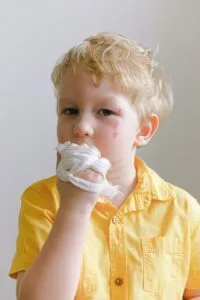Understanding Chronic Wounds and How to Treat Them
Chronic wounds are more than just a nuisance. They disrupt lives. They bring pain. They refuse to heal.
It starts small. A cut. A scrape. A pressure sore. Weeks pass. No improvement.
The frustration builds. The pain lingers. The worry grows.
You’re not alone. Millions struggle with chronic wounds every year. These wounds defy normal healing processes. They last longer than four weeks. They need specialized care.
Chronic wounds demand attention. If left untreated, complications arise. Infections. Tissue death. Amputations.
What makes a wound chronic? Several factors. Poor circulation. Underlying diseases like diabetes. Infection. Nutritional deficiencies.
Proper chronic wound management is essential. Effective treatments exist. Advanced therapies help. The right care makes a difference.
Looking for expert guidance? The specialists at Jefferson Health offer valuable insights. They outline treatment approaches designed for stubborn wounds.
Additionally, Queensland Health provides a comprehensive guide to wound care specialists and best practices. Their research highlights crucial wound healing techniques.
Advanced Wound Care: The Key to Healing Chronic Wounds
Chronic wounds are a significant medical challenge, often resisting conventional treatments and persisting for months or even years. Advanced wound care is crucial in promoting healing and improving the quality of life for patients suffering from these non-healing wounds. By utilizing cutting-edge therapies and personalized treatment plans, healthcare providers can enhance the healing process and prevent severe complications, including infections and amputations.
What Causes Chronic Wounds Not to Heal?
A chronic wound lingers. It refuses to close. But why? Several underlying factors contribute to delayed healing, including:

1. Poor Circulation
Blood flow delivers essential oxygen and nutrients to tissues, which are necessary for wound healing. Conditions such as peripheral artery disease (PAD) and diabetes can restrict circulation, leading to prolonged wound healing times and increased risk of infection.
2. Infections
Bacteria can invade an open wound, delaying healing and increasing the risk of complications such as cellulitis and sepsis. Chronic infections create biofilms—layers of bacteria that resist standard antibiotics and immune responses.
3. Underlying Medical Conditions
Diabetes, kidney disease, and vascular disorders impair the body’s natural ability to heal. For example:
- Diabetes causes nerve damage and reduced circulation, leading to foot ulcers and other chronic wounds.
- Kidney disease affects overall metabolism and immune function, reducing healing capacity.
- Vascular disorders limit blood supply, starving tissues of oxygen and essential nutrients.
4. Pressure and Trauma
Repeated pressure or friction on a wound site can prevent proper closure. This is especially common in pressure ulcers, where continuous pressure on bony areas reduces blood flow, leading to tissue breakdown.
5. Smoking and Malnutrition
- Smoking restricts oxygen flow and damages blood vessels, making wound healing significantly slower.
- Poor nutrition deprives the body of proteins, vitamins, and minerals essential for tissue repair.
Addressing these factors is critical to promoting healing. With the advent of advanced wound care, innovative treatments such as negative pressure wound therapy (NPWT) are transforming patient outcomes.
Chronic Wound Management: Personalized Approaches
Every patient is different. Every wound is unique. Chronic wound management requires tailored strategies.
- Infection Control
A clean wound heals faster. Infection prevention is key. Strategies include:
- Regular wound cleaning
- Proper dressing applications
- Antibiotics when needed
- Pressure Relief
For pressure ulcers, reducing stress on the wound is critical. Solutions include:
- Repositioning bedridden patients
- Using specialized mattresses
- Protective padding for at-risk areas
- Nutritional Support
A proper diet accelerates healing. Essential nutrients include:
- Protein – Builds new tissue.
- Vitamin C – Boosts collagen production.
- Zinc – Strengthens immune response.
- Iron – Aids oxygen transport.
Discover more in our nutrition for wound healing guide.
Wound Care Specialists: When to Seek Professional Help
Wounds are a part of life, but not all wounds heal the same way. While minor cuts and scrapes typically heal on their own with proper at-home care, some wounds require expert medical attention to prevent complications. If left untreated, chronic or slow-healing wounds can lead to severe infections, tissue damage, and even amputation. Knowing when to seek professional wound care is crucial for your health and well-being.
Signs You Need a Wound Care Specialist
If your wound exhibits any of the following signs, it’s time to seek specialized medical care:
1. The Wound Hasn’t Healed in Four Weeks
A wound that remains open and unhealed for more than four weeks is classified as a chronic wound. These wounds often require advanced treatments beyond basic first aid to promote healing. Underlying conditions such as diabetes, poor circulation, or infections may be preventing normal recovery.
2. Signs of Infection Are Present
Infection is a serious complication that can worsen a wound and spread to surrounding tissues. Warning signs include:
- Increased redness and swelling around the wound
- Unusual warmth at the wound site
- Pus or foul-smelling drainage
- Fever or chills, indicating systemic infection
An infected wound requires immediate professional intervention to prevent further complications.
3. The Wound Becomes Increasingly Painful
While some discomfort is expected with injuries, increasing or persistent pain can signal an underlying issue. Nerve damage, infections, or poor circulation can contribute to prolonged pain and require specialized treatment.
4. Excessive Drainage or Pus
If your wound is producing large amounts of fluid, particularly thick, yellow, or green pus, it may indicate infection or improper healing. A wound care specialist can assess the situation and provide appropriate treatments, such as debridement or antibiotic therapy.
5. Wounds in High-Risk Patients
Certain individuals are more prone to wound healing complications due to medical conditions such as:
- Diabetes – Increased risk of foot ulcers and slow-healing wounds
- Peripheral artery disease (PAD) – Reduced blood flow affects tissue repair
- Venous insufficiency – Chronic venous ulcers require specialized compression therapy
- Compromised immune system – Conditions like cancer or autoimmune diseases slow down the healing process
If you have any of these conditions and notice a wound that is not improving, seeking expert care is essential.
How a Wound Care Specialist Can Help
At OWC Center, we provide comprehensive, evidence-based wound care tailored to your specific needs. Our team of specialists utilizes advanced treatments to promote faster healing and prevent complications. These treatments include:
1. Advanced Wound Dressings
From antimicrobial dressings to moisture-retentive bandages, specialized wound coverings can enhance healing by maintaining the optimal wound environment.
2. Negative Pressure Wound Therapy (NPWT)
This innovative therapy uses controlled suction to remove excess fluid, promote blood circulation, and accelerate healing for chronic and complex wounds.
3. Wound Debridement
Removing dead or infected tissue is crucial for promoting healthy new tissue growth. Our specialists use precise debridement techniques to optimize healing conditions.
4. Hyperbaric Oxygen Therapy (HBOT)
By increasing oxygen delivery to the wound site, HBOT supports faster tissue regeneration and reduces the risk of infection.
5. Personalized Treatment Plans
Every wound is unique. Our specialists assess your condition, medical history, and lifestyle to develop a customized care plan designed for optimal recovery.
Why Choose OWC Center?
At OWC Center, we are dedicated to providing expert wound management with compassion and innovation. Whether you are dealing with a non-healing wound, post-surgical complication,
The Role of Advanced Wound Care Technologies
Modern medicine has transformed wound healing. Cutting-edge therapies include:
- Negative Pressure Wound Therapy (NPWT) – Uses vacuum technology to promote faster healing.
- Hyperbaric Oxygen Therapy – Enhances oxygen supply to damaged tissues.
- Skin Substitutes – Lab-grown tissue that supports wound closure.
Learn more about the latest breakthroughs in advanced wound care.
Preventing Chronic Wounds: What You Can Do
Chronic wounds can be avoided. Prevention is key.
- For diabetics – Inspect feet daily, wear protective shoes.
- For the bedridden – Reposition every 2–4 hours to prevent pressure sores.
- For those with poor circulation – Regular exercise, compression therapy.
- For general wound care – Keep wounds clean, dry, and well-dressed.
By implementing these strategies, you reduce your risk. If you need specialized care, trust the experts at OWC Center. Their wound care specialists provide tailored treatment plans for every patient.
Chronic wounds are challenging. But with the right chronic wound management strategies, healing is possible. Seek expert care. Follow best practices. Stay proactive. Your recovery starts today.
Chronic wounds are a serious health concern, affecting millions and often resisting conventional healing methods. Factors like poor circulation, infections, underlying medical conditions, and inadequate nutrition play a significant role in delayed recovery. Without proper care, these wounds can lead to severe complications, including infections, tissue damage, and even amputations.
Advanced wound care techniques offer promising solutions. Negative pressure wound therapy, hyperbaric oxygen treatments, and specialized dressings have significantly improved healing rates. Proper wound management includes infection control, pressure relief, and nutritional support. Addressing these factors not only promotes faster healing but also prevents future complications.
Prevention remains key. Diabetics benefit from daily foot inspections and protective footwear. Bedridden individuals must reposition frequently to avoid pressure sores. For those with circulation issues, exercise and compression therapy enhance blood flow. Simple wound care practices—keeping wounds clean, dry, and protected—can make a world of difference.
Seeking professional help is crucial when wounds show signs of infection, fail to heal within four weeks, or cause increasing discomfort. At OWC Center, specialized care and cutting-edge treatments are available to guide patients toward recovery. With the right strategies and expert support, healing is possible, and long-term health outcomes can be improved.
Key Takeaways
- Chronic Wounds Require Specialized Care
Chronic wounds don’t heal on their own and often require expert intervention. If a wound hasn’t improved in four weeks, it may need advanced treatment. OWC Center’s wound care specialists provide personalized care plans, ensuring the best possible healing outcomes. - Poor Circulation and Infection Can Delay Healing
Conditions like diabetes, vascular disease, and infections can slow down wound healing. Addressing these underlying issues with vascular wound care and infection control can make a significant difference in recovery. - Advanced Wound Care Technologies Accelerate Recovery
Innovations such as Negative Pressure Wound Therapy (NPWT) and Hyperbaric Oxygen Therapy can speed up healing for stubborn wounds. Explore advanced wound care solutions that promote faster recovery and prevent complications. - Proper Nutrition Supports Wound Healing
A well-balanced diet rich in protein, vitamin C, and zinc plays a crucial role in tissue repair. Learn how nutrition impacts wound recovery and how dietary changes can help you heal faster.
Prevention is Key to Avoiding Chronic Wounds
Regular foot inspections, pressure relief techniques, and proper wound care can help prevent wounds from becoming chronic. If you’re at risk, schedule an appointment with OWC Center for a proactive wound care plan.
Related Questions and Answers
1. What Causes Chronic Wounds Not to Heal?
Several factors can contribute to a wound becoming chronic, including:
- Poor circulation – Reduces oxygen and nutrient supply to tissues.
- Infections – Bacteria slow down healing and may cause complications.
- Diabetes and other medical conditions – Weaken the immune system, making healing difficult.
- Repeated trauma or pressure – Reopening of wounds due to friction or pressure.
- Smoking and poor nutrition – Impair tissue repair mechanisms.
Managing these factors through advanced wound care can significantly improve healing outcomes.
2. How Do You Know If a Wound Is Infected?
Signs of wound infection include:
- Redness, warmth, and swelling around the wound.
- Increased pain or tenderness.
- Foul-smelling discharge or pus.
- Fever or chills in severe cases.
If you notice these symptoms, seek wound care specialists for appropriate treatment.
3. Can Chronic Wounds Be Prevented?
Yes! Prevention strategies include:
- For diabetics – Regular foot inspections and wearing protective footwear.
- For bedridden individuals – Repositioning every few hours to prevent pressure injuries.
- For those with poor circulation – Compression therapy and exercise to improve blood flow.
- For general wound care – Keeping wounds clean, dry, and properly dressed.
4. What Role Does Nutrition Play in Wound Healing?
A wound recovery diet is crucial for healing. Key nutrients include:
- Protein – Supports tissue regeneration.
- Vitamin C – Enhances collagen formation.
- Zinc – Strengthens the immune response.
- Iron – Supports oxygen transport to tissues.
For more details, visit our guide on nutrition for wound healing.
5. When Should You See a Wound Care Specialist?
Consider seeing a specialist if:
- The wound has not healed after 4 weeks.
- There are signs of infection or worsening symptoms.
- You have a chronic illness like diabetes that affects healing.
- The wound is deep or has excessive drainage.
At OWC Center, our wound care specialists provide comprehensive treatment plans tailored to your needs. Schedule an appointment today.




